EROL Note: Literature & Ideology was a quarterly publication associated with the group that became the Communist Party of Canada (Marxist-Leninist). Early in 1975, Literature & Ideology merged with Alive magazine to form Alive Magazine: Literature & Ideology. In 1976, in resumed publication under the title New Literature & Ideology.
* * *
Problems of Ideology in Criticism
P. Kogan, A Materialist Analysis of Shakespeare’s Sonnets
James Riche, Anarchism and Reaction in Contemporary Afro-American Literature
Keng Hui-chuan, To Become One With the Workers and Peasants
J. S. Thompson, Vagabond Journalism: Literature and Criticism Underground
J. D. S.[imon], Revisionist Criticism in Our Time
D. Johnson, “Harlem on My Mind”
Problems of Ideology in Criticism
Sol Zollman, Sylvia Plath and Imperialist Culture
J. S. Thompson, The Popularization of Fascist Anthropology
P. Kogan, Beyond Solipsism to Irrationalism: A Study of Iris Murdoch’s Novels
H. B. Singh, V. S. Naipaul: A Spokesman for Neo-Colonialism
D. Johnson, The Materialist Outlook in Contemporary Art
Kenneth Phillips, The Subversion of Theology in Seventeenth Century Poetry: A Note on George Herbert
J. D. S.[imon], Northrop Frye and Reactionary Criticism
James Riche, Black Poetry
W. E. Robinson, Assenting Academicians and Louis Kampf
Introducing the Necessity for Change Institute of Ideological Studies
P. Kogan, Two Lines in the Teaching of Macbeth
Sol Zollman, Fascist and Obscurantist Propaganda in Morley Callaghan
James Riche, Decadence in Contemporary American Fiction
J. S. Thompson, Black Studies versus Black Liberation
The Promotion of Corporate Sensate Culture in Bourgeois Literature
Thought Control in American Universities
The Canadian Student Movement, The Tasks of the Canadian Revolutionary Youth
J. D. S.[imon], Gombrich in Search of Cultural History
W. E. Robinson, Student Rebellion
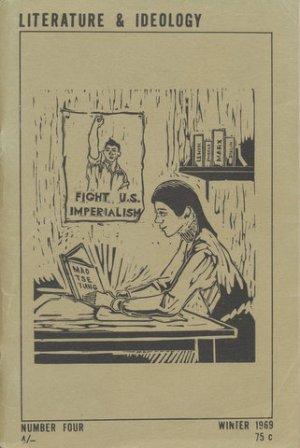
J. S. Thompson, The Reactionary Idealist Foundations of Noam Chomsky’s Linguistics
P. Kogan, The Political Theme of Milton’s Paradise Lost
James Riche, Propaganda for Population Control in Bourgeois Novels
J. D. Simon, Revolutionary Chinese Fiction
Margaret J. Brown, The Treatment of Money in American Fiction
D. Johnson, Class Struggle in the Teaching of Art
Pro-Imperialist African Writing Today
Cultural Oppression Under U.S. Imperialism
Sol Zollman, Social Relations in Modern American Poetry
P. Kogan, Class Struggle in the Superstructure in Spenser’s Faerie Queene
G. V. Mehrotra, The Neo-Colonial Literature of India
J. S. Thompson, The Reactionary Basis of Freudian Literary Criticism
Sheila Ann Murphy, Fascism in Contemporary Irish Fiction
J. D. Simon, Contemporary Chinese Operas on Revolutionary Themes
Noam Chomsky Defends his Imperialist “Honor”
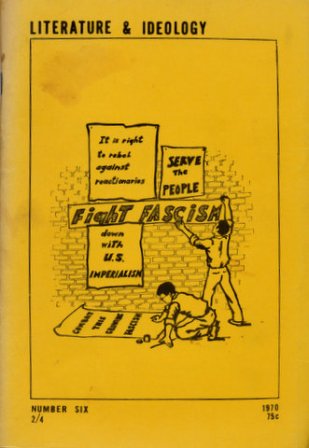
Combat This Growing Fascism
P. Kogan, The Fascist Premises of Archetypal Criticism
Eric Scheper, Herbert Marcuse: The Ideologue as Paid Agent of U.S. Imperialism
Caroline Borden & J. S. Thompson, Theories of Innate Ideas Serve Fascism
Armand Barotti, Fascist Ideology of the Self: Mailer, Rubin and Hoffman
Mary Ellen Brooks, Eldridge Cleaver the Counter-Revolutionary
Hitler Studies
“Myth Critics” in Class Struggle
The Reactionary Bauhaus Line in Art
“Afro-American Artists: New York and Boston”
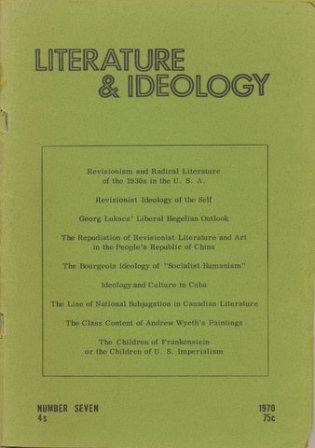
James Riche, Revisionism and the Radical Literature of the 1930s in the U. S. A
Mary Ellen Brooks, Revisionist Ideology of the Self
J. D. Simon, Georg Lukacs’ Liberal Hegelian Outlook
The Repudiation of Revisionist Literature and Art in the People’s Republic of China
Sol Zollman, The Bourgeois Ideology of “Socialist Humanism”
Caroline Borden, Ideology and Culture in Cuba
J. Wilson Clark, The Line of National Subjugation in Canadian Literature
D. Johnson, The Class Content of Andrew Wyeth’s Paintings
P. Kogan, The Children of Frankenstein or the Children of U.S. Imperialism
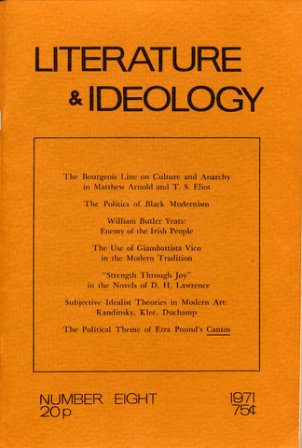
P. Kogan, The Bourgeois Line on Culture and Anarchy in Matthew Arnold and T. S. Eliot
Sheila Ann Murphy, William Butler Yeats: Enemy of the Irish People
Anthony Conte, The Use of Giambattista Vico in the Modern Tradition
J. S. Thompson, The Political Theme of Pound’s Cantos
D. Johnson, Subjective Idealist Theories in Modern Art: Kandinsky, Klee, Duchamp
N. David Fairbanks, “Strength Through Joy” in the Novels of D. H. Lawrence
Sol Zollman, Modern Masters of Reaction
James Riche, The Politics of Black Modernism
P. Kogan, The Class Character of Academic Literary History
Wen Chun, Uphold the Marxist Theory of Classes, Criticize the “Theory of Human Nature”
Sol Zollman, Criticism, Self-Criticism, No Transformation: The Poetry of Robert Lowell and Anne Sexton
James Riche, Pragmatism: A National Fascist Mode of Thought
J. Wilson Clark, Distortion of Canadian History in Criticism
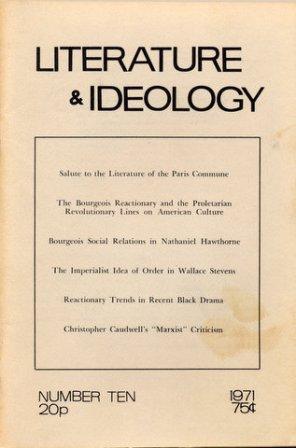
Hua Wen, Salute to the Literature of the Paris Commune
James Riche, The Bourgeois Reactionary and the Proletarian Revolutionary Lines on American Culture
Caroline Borden, Bourgeois Social Relations in Nathaniel Hawthorne
Armand Barotti, The Imperialist Idea of Order in Wallace Stevens
Mary Ellen Brooks, Reactionary Trends in Recent Black Drama
Roger Schuyler, Christopher Caudwell’s “Marxist” Criticism
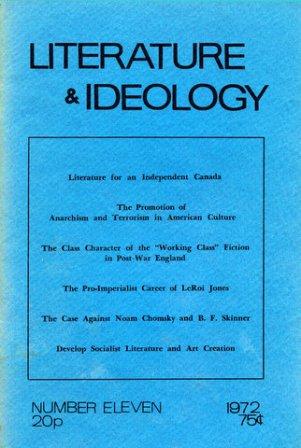
J. Wilson Clark, Literature for an Independent Canada
James Riche, The Promotion of Anarchism and Terrorism in American Culture
N. David Fairbanks, The Class Character of the “Working Class” Fiction in Post-War England
Mary Ellen Brooks, The Pro-Imperialist Career of LeRoi Jones
J. S. Thompson, The Case Against Noam Chomsky and B. F. Skinner
Develop Socialist Literature and Art Creation
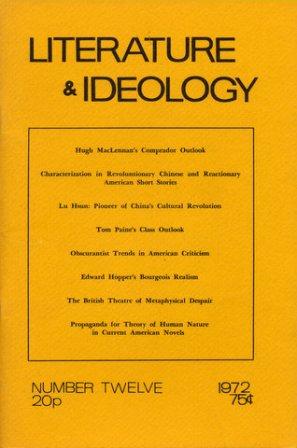
J. Wilson Clark, Hugh MacLennan’s Comprador Outlook
Caroline Borden, Characterization in Revolutionary Chinese and Reactionary American Short Stories
Chou Chien-jen, Lu Hsun: Pioneer of China’s Cultural Revolution
Armand Barotti, Tom Paine’s Class Outlook
P. Kogan, Obscurantist Trends in American Criticism
D. Johnson, Edward Hopper’s Bourgeois Realism
Mary Ellen Brooks, The British Theatre of Metaphysical Despair
Sol Zollman, Propaganda for Theory of Human Nature in Current American Novels
Su Hsi, The Struggle Between the Theory of Classes and the Theory of Human Nature in Literature and Art
Sol Zollman, John Steinbeck’s Political Outlook in The Grapes of Wrath
Mary Ellen Brooks, Richard Wright’s “Artistic Conscience”
J. Wilson Clark, Pro-Imperialist Ideas in Gabrielle Roy’s Tin Flute
Caroline Borden, Characterization in Faulkner’s Light in August.
Lee Steinberg, The Subjective Idealist “Quest for True Men” in Hemingway’s For Whom the Bell Tolls
Y. S. Bains, Tragedy and Human Nature in William Shakespeare’s King Lear
The Shanghai Revolutionary Mass Criticism Writing Group, Comments on Stanislavsky’s “System”
Y. S. Bains, Revisionist Critics and William Shakespeare
Mary Ellen Brooks, Soviet Revisionist Distortions of Lenin on the Question of Partisanship in Literature
J. Wilson Clark, Gelinas’s Propaganda for Reformism and Terrorism in Quebec
Pien Cheh, A General Review of New Art Works at the National Fine Arts Exhibition in Peking
Mary Ellen Brooks, The Ideal and the Hero in Revisionist Literature
Charles M. LeMoyne, The Ideology of Comparative Canadian Literature
Frank P. Neilson, The Plague: Camus’s Pro-Fascist Allegory
J. Wilson Clark, Two Lines in Canadian Literary History
Lee Steinberg, Trilling’s Mind/Nation-State in Crisis
Deirdre Egan, The Wedding: A Novel About Albanian Women
Gillian Duran, Terrorism, Human Nature, and Hugh MacLennan’s Return of the Sphinx
Wen Chun, An Opera on Proletarian Internationalism